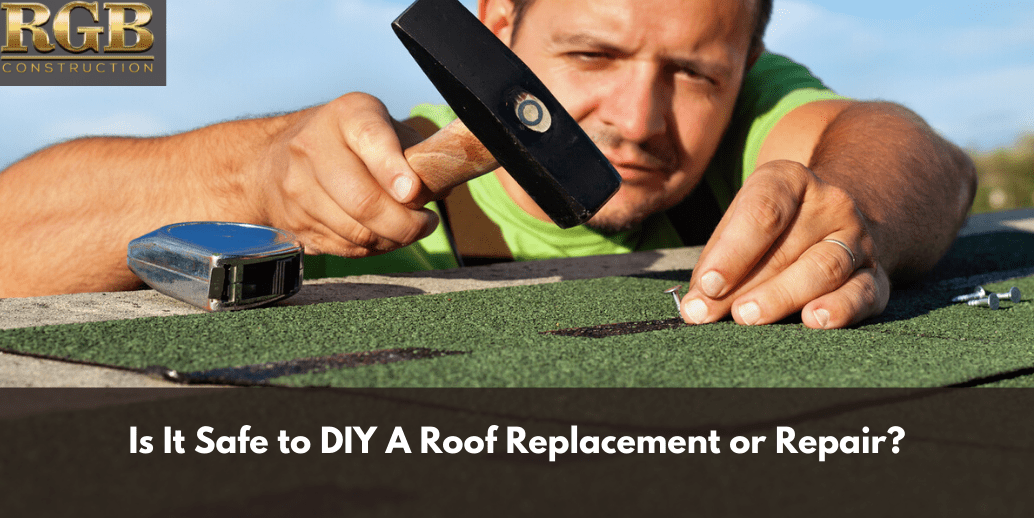Introduction: Don’t Try It
This article is intended for those who might be considering some DIY roof repair. We want to start by telling you one thing: Don’t try it unless you are fully qualified. Unless you have worked as a professional roofer in the past, you probably don’t have the knowledge to do the job correctly. More importantly, you could get yourself hurt or even killed.
To be fair, there are a few small roofing jobs that can be done by an amateur. Even then, extreme care is needed. For the most part, DIY roof repair just isn’t worth the trouble.
You Won’t Save Much Money
Let’s start with the biggest problem: A DIY roof job will often be just as expensive as a professional job. In some cases, it may even cost more. Why is this? Well, there are two reasons.
First, roofing companies can usually acquire shingles, flashing, and other roofing supplies at a discounted cost. Since they are buying large quantities of the stuff, the supply companies are generally willing to cut them a better deal. As a small-scale buyer, you will probably be paying top price for everything.
Second, roofing professionals often know ways to save money. There are all kinds of little tricks that an amateur simply would not know. A professional is often trained in multiple methods, which means they can choose the most cost-efficient plan for any given roof. Once again, you probably don’t have that kind of knowledge.
You Will Void Your Warranty
If you have purchased a roof within the last few years, it is sure to be under warranty. If not, you made a big mistake. Your roof warranty is essential, as it guards a considerable investment. Well, guess what? You will probably void your warranty as soon as you hang the first shingle or drive the first nail.
Most roof warranties have a clause stating that they will only cover the work of properly certified professionals. As soon as an amateur (like you) does any work on the roof, those terms are null and void.
What Can Happen If Things Go Wrong:
Roofing is one of the most dangerous jobs out there. To get a better idea, let’s look at this report from an occupational safety organization. The numbers here come from the years 1992-1998, so they’re a little outdated. Still, we see no reason to think that the roofing business has gotten any less dangerous since then.
About 50 roofers die every year, with the vast majority of these deaths coming from falls. Some also die from electrocution, as power lines and roofs don’t tend to be all that far apart. That brings us to another concern: Without the proper knowledge of electrical systems, a DIY roofer could easily end up seriously injured, or worse.
For an example of that, see this report from the state of Massachusetts. A 23-year old roofer was shocked to death when an aluminum ladder came into contact with nearby power lines. Not only did it kill the man holding the ladder, but it also severely injured two others that were standing nearby. Now think about this for a minute: That guy was a professional. If it can happen to him, something like that can certainly happen to you.
Small Jobs That You Can Do Yourself:
There are certain jobs that you can do yourself. You don’t necessarily have to call a roofing contractor for every single thing. Of course, you will still run the risk of voiding your warranty if the company finds out about your work.
For one thing, cleaning out your gutters is a part of roof maintenance that is well within the scope of the average homeowner. You will need a ladder that is tall enough to reach the gutters, and (of course) you will need to be careful here, but it won’t be a dangerous job if done correctly. Try to have someone at the base of the ladder to hold it steady.
If you have loose shingles, and they are located in a spot that is easy to access, you might be able to nail them back in place without worry. If they are located close to the eaves, you might be able to use your ladder. If you do climb on your roof for any reason, bear in mind that we have advised against this.
Cleaning or changing your vents is also probably within your ability, but only if you exercise proper safety precautions. If you have ever watched professional roofers at work, you know that they use a system of ropes and harnesses to help prevent falling, and as we have seen, even they sometimes fall and die.
As such, don’t even attempt to do a job on your roof without fall protection. This kind of thing is so crucial that roofing companies can be taken to court by the government if they fail to provide their workers with an adequate level of fall protection. We aren’t advising you to get on your roof for any reason, but those who ignore our advice should at least use a good strong rope.
Conclusion
All of this comes down to one thing: Even though a professional roofing contractor might not be the cheapest option, it is by far the safest option. Depending on how cheaply you can acquire your roofing supplies, it might even be more affordable to go ahead and hire a professional. Even if it does cost more money, you need to ask yourself: Is it worth it?
If you are in need of a trusted, professional roofing company, fill out the contact form below, and someone will get back to you right away.







